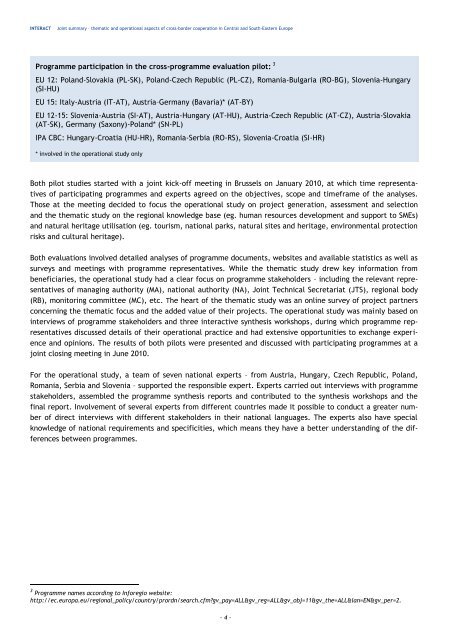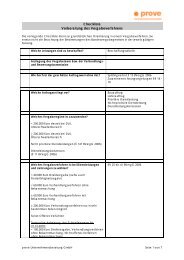Cross-programme evaluation: joint summary - Interact
Cross-programme evaluation: joint summary - Interact
Cross-programme evaluation: joint summary - Interact
You also want an ePaper? Increase the reach of your titles
YUMPU automatically turns print PDFs into web optimized ePapers that Google loves.
INTERACT<br />
Joint <strong>summary</strong> – thematic and operational aspects of cross-border cooperation in Central and South-Eastern Europe<br />
Programme participation in the cross-<strong>programme</strong> <strong>evaluation</strong> pilot: 3<br />
EU 12: Poland-Slovakia (PL-SK), Poland-Czech Republic (PL-CZ), Romania-Bulgaria (RO-BG), Slovenia-Hungary<br />
(SI-HU)<br />
EU 15: Italy-Austria (IT-AT), Austria–Germany (Bavaria)* (AT-BY)<br />
EU 12-15: Slovenia-Austria (SI-AT), Austria-Hungary (AT-HU), Austria-Czech Republic (AT-CZ), Austria-Slovakia<br />
(AT-SK), Germany (Saxony)-Poland* (SN-PL)<br />
IPA CBC: Hungary-Croatia (HU-HR), Romania-Serbia (RO-RS), Slovenia-Croatia (SI-HR)<br />
* involved in the operational study only<br />
Both pilot studies started with a <strong>joint</strong> kick-off meeting in Brussels on January 2010, at which time representatives<br />
of participating <strong>programme</strong>s and experts agreed on the objectives, scope and timeframe of the analyses.<br />
Those at the meeting decided to focus the operational study on project generation, assessment and selection<br />
and the thematic study on the regional knowledge base (eg. human resources development and support to SMEs)<br />
and natural heritage utilisation (eg. tourism, national parks, natural sites and heritage, environmental protection<br />
risks and cultural heritage).<br />
Both <strong>evaluation</strong>s involved detailed analyses of <strong>programme</strong> documents, websites and available statistics as well as<br />
surveys and meetings with <strong>programme</strong> representatives. While the thematic study drew key information from<br />
beneficiaries, the operational study had a clear focus on <strong>programme</strong> stakeholders – including the relevant representatives<br />
of managing authority (MA), national authority (NA), Joint Technical Secretariat (JTS), regional body<br />
(RB), monitoring committee (MC), etc. The heart of the thematic study was an online survey of project partners<br />
concerning the thematic focus and the added value of their projects. The operational study was mainly based on<br />
interviews of <strong>programme</strong> stakeholders and three interactive synthesis workshops, during which <strong>programme</strong> representatives<br />
discussed details of their operational practice and had extensive opportunities to exchange experience<br />
and opinions. The results of both pilots were presented and discussed with participating <strong>programme</strong>s at a<br />
<strong>joint</strong> closing meeting in June 2010.<br />
For the operational study, a team of seven national experts – from Austria, Hungary, Czech Republic, Poland,<br />
Romania, Serbia and Slovenia – supported the responsible expert. Experts carried out interviews with <strong>programme</strong><br />
stakeholders, assembled the <strong>programme</strong> synthesis reports and contributed to the synthesis workshops and the<br />
final report. Involvement of several experts from different countries made it possible to conduct a greater number<br />
of direct interviews with different stakeholders in their national languages. The experts also have special<br />
knowledge of national requirements and specificities, which means they have a better understanding of the differences<br />
between <strong>programme</strong>s.<br />
3 Programme names according to Inforegio website:<br />
http://ec.europa.eu/regional_policy/country/prordn/search.cfm?gv_pay=ALL&gv_reg=ALL&gv_obj=11&gv_the=ALL&lan=EN&gv_per=2.<br />
- 4 -
















